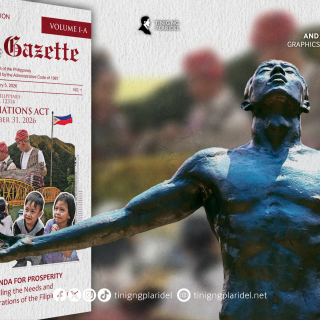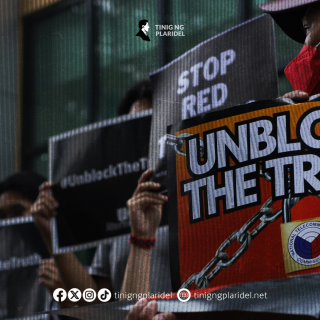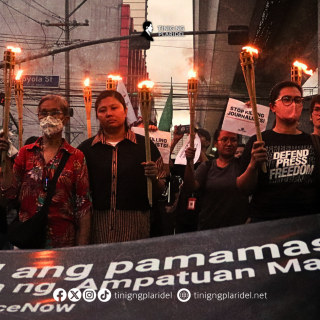The faces of candidates, both old and new, seize every inch of space in the run up to the May 9 elections–streets, television and social media sites, many others.
They vow to solve this and do that. Their promises load the airwaves until it reaches the ears of the voters they hope to woo, a majority of which belong to the middle and working class.
For many political aspirants, these sectors can make or break their rise to power. But more than a vote, they are also people with real stories and aspirations for the nation.
Stanley Abadies drives on election tarpaulin-filled roads of eastern Metro Manila to accomplish the orders of his boss who works in the Bureau of Jail and Management Penology. | Photo by Guinevere Latoza
Stanley Abadies, 37, grew up in Negros Occidental. When he was a teenager, he was recruited to be a bodyguard for a local politician. Abadies said that during election years, his pockets would overflow with money because of his work.
In his 20s, Abadies was forced to sail to his mother in Manila because he got caught up in street fights. He worked several blue-collar jobs in the city, mainly as a driver.
Hard work is a dominant theme in his life, as he told TNP he has never felt the government’s programs for commonfollk like him. Especially in times of health issues, he says his relatives are left helpless.
In 2015, Abadies’ girlfriend accused him of theft and rape. He was detained in the Quezon City Jail and was released when his case was cleared a year later. A jail personnel recognized his skill and made him a prison trustee. He was made a driver for the Bureau of Jail and Management Penology upon his release.
Now, he, in some way, is part of the government that he deemed absent for most of his life. But because of his experiences, shading the ballot this May is not even an option for him.
“Siguro ‘yung ibang tao nakikita kong natutulungan; ‘yun lang. Pero sa sarili ko, hindi ko ramdam kasi hindi naman ako nakaranas na natulungan ako ng gobyerno … maliban na lang na nagtatrabaho ako ngayon para sa gobyerno,” he lamented.
In an ideal world, he wishes that when someone gets laid off, the government would be there to usher them back into the workforce. When someone’s health declines, Abadies hopes that hospitals would welcome them without the grueling financial negotiations.
“[‘Yung uri ng gobyerno na gusto ko ay ‘yung may] magandang pamamalakad, makatao. Aat saka ramdam [dapat] ng lahat ng tao na may gobyernong sumusuporta,” Abadies said.
Marikina Antipolo Operators Drivers Association member Erwin Pintang rests at their Marikina terminal in the midday sun of a normal workday. | Photo by Guinevere Latoza
After almost two years of being denied their livelihood, jeepney drivers are out on the road to make ends meet. But traffic enforcers hound them for money the moment they commit the slightest mistake.
When oil prices soared and all commodities followed suit, the government promised financial aid for those affected. But not for the kings of the roads. This is life on the streets as narrated by Erwin Pintang, 48, a jeepney driver of 30 years.
Before the pandemic took a chokehold on almost all industries in 2020, Pintang would earn about P2,000 daily. This, he said, was enough for him and his family.
But now, a mere P500 is all that his hands could feel. This is a quarter of what he would usually earn; that is if he’s lucky enough to pick up as many passengers for the day. Other days, the income is nil.
“Habang sinasabi nilang lumuluwag ang sa tao, pero ‘yung hanapbuhay pahirap naman nang pahirap sa taas ng bilihin—sa taas ng diesel,” he sighed, narrating the effects of successive oil price hikes in the country.
The Land Transportation Franchising and Regulatory Board promised to distribute PHP 6,500 fuel vouchers to over 377,000 eligible public utility vehicle (PUV) drivers starting March 15. But Pintang was disappointed when he found out that his name was not included in the beneficiary list.
For many other drivers, the fuel subsidies would pass through operators before landing into their hands.
Pintang also condemned the PUV Modernization Program because it blocked him and fellow jeepney drivers from sustaining their livelihoods. If they want to keep earning, they have to come up with at least P1 million to avail new, foreign-supplied “modern jeeps” in exchange for their colorful, open-air jeepneys.
“Parang bus nga, ang pangit naman ng itsura. Parang kabaong—[galing] China pa,” Pintang quipped.
And if that is still not enough of a burden, traffic enforcers drain the little money they earn a day.
“Ginagawa nila kasing katasan ‘yung mahihirap na katulad naming bumabiyahe lang. Masilipan ka lang nang konti, magkano ang violation? Minimum P1,000. Eh kinikita mo lang P300. Abonado ka pa. Magkamali ka ng sagot pa dun sa nanghuli sa ‘yo, ‘isuspinde kita,’” he said.
All that Pintang wishes for the next administration to have is to halt the modernization program and put an end to the corruption that manifests inside the government.
“Baguhin naman nila. Sana makita nila [kami], hindi ‘yung negosyante na lang ang tinitingnan, makita nila ‘yung mga mahihirap din,” the jeepney driver said.
Ernanita Dalogdog prepares to close her store on a rainy evening at Tandag City Public Market. | Photo by J-Ann Avila
Bananas became 58-year-old Ernanita Dalogdog’s safety net when she moved to Tandag, Surigao del Sur more than three decades ago, fleeing the threatening environment of her hometown in the mountains of San Miguel.
Fed up with frequent evacuations from armed conflict during the latter years of martial law, she and her family of farmers decided to permanently leave home and bring their young children down to another town.
As suggested by her older sister, she set up a table by the streetside to sell bananas. This became her daily task until 1990, when she finally put up her own store at a public market.
Three devastating fire incidents later and now in the middle of a pandemic, Dalogdog is still selling bananas.
“Our profit here is tagok (banana sap),” she said in Tandaganon, her mother tongue. “After all these years, we are still drowning in debt.”
The pandemic was especially challenging for them. For a month in 2020, they were denied income as the entire market was put under lockdown in response to the increasing number of COVID-19 cases in the area.
“We just stayed at home with my three grandchildren, eating lugaw, gamos (fish paste), gulay, and ganas (camote tops),” she said.
On May 9, Dalogdog says she will surely vote for the politicians who their family received cash assistance from in the past years. She said she wants a leader who sees and understands the struggles of the poor. But “I don’t think there’s a leader who can really help us,” she said. “We have to persevere on our own.”
Rogelio Dalagan packs up after a day’s fishing at the Port of Tandag, Surigao del Sur. | Photo by J-Ann Avila
Rogelio Dalagan, 71, has been fishing the waters of Surigao del Sur for almost five decades now.
The province’s history is marked by many typhoons. Typhoon Auring, the most recent one, severely hit Dalagan’s home by the sea and forced his family to evacuate.
He said he received cash assistance from the government, but not without local staff grumbling.
“They told me I’m supposed to be ineligible for the cash assistance because I have a child working outside the country,” he said in Tandoganon. “But my children’s jobs are their own efforts to provide for their own families. My wife and I cannot entirely depend on them.”
He alone shoulders the repair expenses of his small boat, which has always been the case.
As a typhoon dies down, it usually takes two weeks before he could fish again. Some people directly go to his house to buy fresh catch, while the remaining ones, his wife sells by the streetside.
With the looming climate crisis, Dalagan and all other fisherfolk are among the most vulnerable. For them, unstable weather patterns mean unpredictable working conditions.
This election, he hopes for sincere and trustworthy leaders who will listen to their problems and truly serve the people. However, already used to negligence, he no longer expects politicians’ promises to be fulfilled.
“They do have a lot of promises ever since, like providing us with equipment. But we never received anything,” he said.
In a few weeks, hundreds of nameplates from national to local government offices will be replaced, but the everyday lives of Abadies, Pintang, Dalogdog and Dalagan will most likely remain the same.
Unless the next leaders listen to the voices this election is crucial for, promises and aspirations will only remain in our political atmosphere, not impacting the lives—the stories—on the ground.









